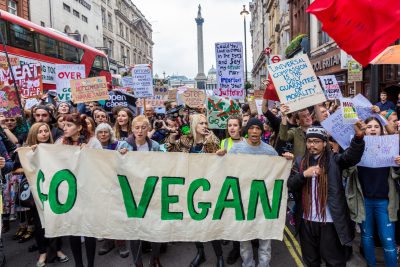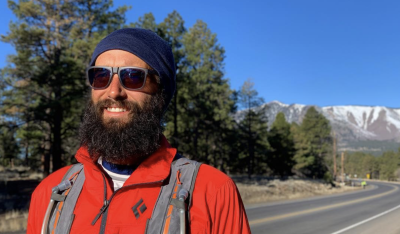I feel sure that, one day, we will look back on speciesism—the belief that humans are more important, and therefore entitled to more rights, than non-human animals—and feel the same mix of anger, shame, and sadness that most of us feel when we consider racism, homophobia, and sexism. Similarly, we will see veganism as part of a broader social justice movement that creates a just and equitable world for all.
Historically, humans have set ourselves apart from animals, viewing our own species as superior, and we drew on a range of differences to bolster that supremacist view. But, as we have come to understand more and more about our non-human brethren, we find we were wrong in almost every case, and science may yet prove us wrong in the remainder.
‘Animals don’t have language,’ we once argued. Except they do.
‘But animals don’t use tools,’ we countered. Except they do.
‘Ah, but they don’t make tools,’ … ahem, what about sea otters, octopuses, crows, chimpanzees, and elephants?
‘OK, but animals don’t have self-awareness.’ But many do.
‘But they cannot deceive.’ Actually, many can.
And so we argued on and on, clutching at straws, desperately trying to prove a point.
Are we so different from animals?
Why are we so reluctant to accept that people are animals, and that while every species—and, actually, every individual—is unique, we share personality traits, and both physical and cognitive abilities with other species? Yes, we can argue that dogs can’t write operas but then nor can most people, and dogs could legitimately respond that when it comes to extraordinary capabilities, humans should come back when they have learned to sniff out cancer cells.
This we-are-better-than-you-because … line of argument is both baseless and pointless, and where we set the bar for ‘supremacy’ has, unsurprisingly, always been where it best suits our argument. It’s a political line, not a scientific or rational one. And for a long time, women, the poor, people who did not have white skin, and others fell on the ‘wrong’ side, along with non-human animals.
history of oppression
Captured and enslaved people were sold at auctions as chattel; women were denied the vote because they were said to act on emotions instead of rationality, just like animals; and workers had no legal protections and so could be used, discarded, and replaced at will—like literal workhorses. The history of humans is, in large part, a history of subjugation and oppression of ‘the other’.
But what is interesting and uplifting is the number of social justice campaigners, both historic and contemporary, that have crossed the human-animal boundary, and worked—or acted personally—to protect both people and animals.
intersectionality
Civil rights activist Rosa Parks was vegetarian. Anti-slavery campaigner William Wilberforce also founded the Society for the Prevention of Cruelty to Animals—the world’s first animal protection group. Angela Davis, a civil rights activist and vegan said: ‘I think there is a connection between… the way we treat animals and the way we treat people who are at the bottom of the hierarchy.’ Last year, Black Lives Matter activist Shaun King announced he had become vegan.
Mexican-American workers’ rights activist, Cesar Chavez, who co-founded the National Farmworkers Association with Dolores Huerta said: ‘I became a vegetarian after realizing that animals feel afraid, cold, hungry and unhappy like we do.’ Huerta was vegetarian, too.
In Victorian England, Annie Besant campaigned for both workers’ and women’s rights, and was vegetarian, while suffragette Frances Power Cobbe was also an anti-vivisection campaigner.
Henry Bergh who founded the American Society for the Prevention of Cruelty to Animals also founded the Society for the Prevention of Cruelty to Children. Like the others mentioned here—and many, many more people, too—he cared about both people and animals.
‘Abusing animals is no more justifiable than abusing people,’ writes human rights campaigner Peter Tatchell, who is best known for his work with LGBT + social justice movements. He said:
‘Sentience is the bond that unites all animal species, human and non-human. I accept our shared animalism and advocate our shared claim to be spared suffering and accorded inalienable rights.’
our decisions matter
We don’t have to love animals—or even like them—to agree that it is never just to deliberately harm and exploit others just because we can, nor that there is a hierarchy of moral worth. And we certainly don’t have to choose between showing compassion to people and animals, as our hearts and minds are big enough to care about both. We can refuse to participate in events, businesses, and conversations where discrimination occurs. We can boycott companies that employ sweatshop labor, publish sexist advertising campaigns, and slaughter animals.
And should we decide to end our involvement in the deliberate harming of non-human animals by changing what we eat, we will simultaneously be helping people. Slaughterhouse work has been linked to a variety of disorders, including PTSD, PITS (perpetration-induced traumatic stress), and an increase in crime rates, including higher incidents of domestic abuse, as well as alcohol and drug abuse. And by being vegan, we significantly reduce our environmental impact and climate-changing emissions. Given that the world’s poorest will bear the brunt of climate breakdown, our consideration of animals is also a consideration of people.
This is the basis of veganism as a social justice movement, and it’s what the activists mentioned above clearly understood: the struggle for equality and justice is a struggle for all. As political activist and long-term vegan Benjamin Zephaniah said:
‘Our own personal struggles should not be separated from our struggle to help others, and those others include animals. If I’m wealthy and I’m comfortable, it doesn’t mean I should not struggle for people who are poorer, and for beings who are not people. We should all stand up for our own rights, but when you stand up for the rights of others – especially for those, like animals, who cannot speak for themselves – that is very special.’



